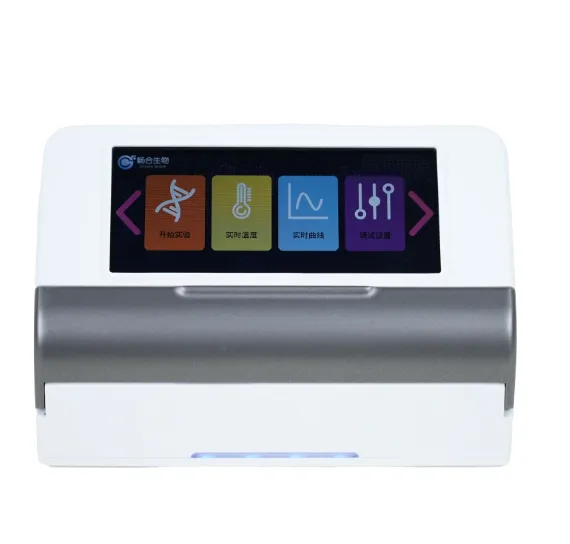
PCR Technology: A Breakthrough in Diagnostics
A PCR-based assay is a cutting-edge diagnostic tool that has transformed medical, veterinary, and research laboratories across the globe. PCR, or Polymerase Chain Reaction, allows for the amplification of minute amounts of DNA, making it possible to detect and identify pathogens with high precision. In a PCR-based assay, specific primers are used to target and amplify particular DNA sequences, providing detailed insight into the presence of a wide range of microbes, including viruses, bacteria, and fungi. This makes it a powerful tool for detecting infections that may not be easily identifiable through traditional methods. With the ability to detect pathogens in real-time and with exceptional accuracy, a PCR-based assay is indispensable in both clinical and research settings, paving the way for faster and more reliable diagnostics.

PCR Detection of Plasmid DNA: Enhancing Genetic Research
In the world of genetic research, the PCR detection of plasmid DNA is an essential tool. Plasmids, which are small, circular DNA molecules found in bacteria, are used extensively in biotechnology and genetic engineering. The PCR detection of plasmid DNA enables scientists to identify and analyze plasmids with a high degree of accuracy. Through PCR, even minute quantities of plasmid DNA can be amplified to detectable levels, facilitating the study of gene cloning, gene expression, and the development of genetically modified organisms. This technology is crucial for a range of applications, from agricultural biotechnology to the production of pharmaceutical proteins. Whether in research or industrial settings, the PCR detection of plasmid DNA is key to advancing genetic and molecular studies, offering precision and speed that were once unthinkable.
PCR for Microbial Identification: Speeding Up Diagnosis
The application of PCR for microbial identification has revolutionized the way microbiologists and healthcare professionals detect and diagnose infections. Traditional methods of microbial identification, such as culturing, can take days to yield results, but PCR for microbial identification allows for the rapid detection of pathogens by amplifying their DNA. This technology is especially useful for identifying difficult-to-culture or slow-growing microorganisms, providing real-time results and improving patient care. In medical diagnostics, PCR for microbial identification is often used to detect bacterial, viral, and fungal infections in patients, allowing healthcare providers to make quick, informed decisions about treatment. This technique also plays a vital role in environmental testing, helping to identify microbial contamination in water, air, and surfaces. The speed and accuracy of PCR for microbial identification are essential in today's fast-paced medical and scientific environments.
PCR in Molecular Diagnostics: Viral and Bacterial Detection
PCR in molecular diagnostics has become a cornerstone of modern medicine, particularly for the detection of both viral and bacterial infections. By amplifying specific genetic material from pathogens, PCR in molecular diagnostics allows for the early detection of diseases that may not be identifiable through conventional diagnostic methods. Whether it is for detecting viral infections like HIV, Hepatitis, or SARS-CoV-2, or bacterial infections like tuberculosis or streptococcus, PCR in molecular diagnostics offers unparalleled sensitivity and accuracy. This technique can detect infections even in their early stages, sometimes before symptoms appear, enabling healthcare providers to administer treatments sooner and prevent the spread of infectious diseases. With advancements in PCR technology, the possibilities for early detection and personalized treatment have never been more promising, ensuring that healthcare professionals can stay ahead in the battle against infectious diseases.
Equipment Used for PCR: Essential Tools for Accurate Diagnostics
The success of PCR relies heavily on the equipment used for PCR, which includes specialized machines and tools that help process and analyze samples. The primary piece of equipment for PCR is the PCR machine, also known as a thermal cycler, which precisely controls the temperature during the amplification process. Along with this, other essential equipment includes micropipettes for sample preparation, centrifuges for separating components, and electrophoresis apparatus for analyzing PCR products. Advances in equipment used for PCR have made it easier for laboratories to perform PCR testing with greater efficiency, automation, and precision. With options for high-throughput testing and improved user interfaces, these tools are crucial for optimizing PCR workflows and achieving reliable, reproducible results. Whether in a clinical setting or research laboratory, equipment used for PCR ensures that PCR testing remains at the forefront of molecular diagnostics.
PCR technology has become an indispensable tool across various fields, from clinical diagnostics to genetic research. With innovations such as the PCR-based assay, PCR detection of plasmid DNA, and PCR for microbial identification, the future of diagnostic and research capabilities looks promising. PCR in molecular diagnostics has made it possible to detect viral and bacterial infections with unprecedented speed and accuracy, while the continuous development of equipment used for PCR ensures that laboratories remain equipped to handle increasing demands. As this technology continues to evolve, it is clear that PCR will remain a cornerstone of scientific and medical advancements for years to come.
-
The Integration of Bio Detection with Artificial IntelligenceNewsMay.23,2025
-
The Importance of Calibration for Bioaerosol SamplersNewsMay.23,2025
-
The Importance of Bio Sampling in Environmental ResearchNewsMay.23,2025
-
The Advantages of Mini PCR TechnologyNewsMay.23,2025
-
How to Perform a Mycoplasma PCR TestNewsMay.23,2025
-
Choosing the Right Bacteria Detection Device for Your NeedsNewsMay.23,2025





